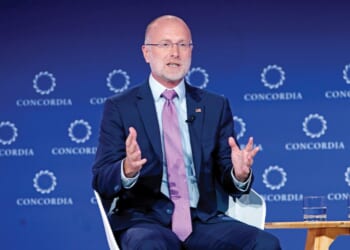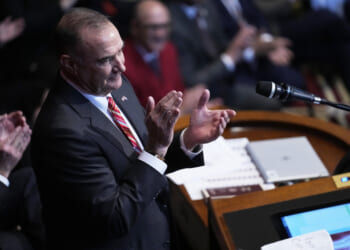President Trump announced Monday that he will federalize control of law enforcement in Washington, D.C. The move follows his threat to act after a brutal attack on a DOGE staffer who tried to defend a woman during a carjacking. National Guard troops will supplement D.C. Metro Police in an effort to quell violent crime. Americans are tired of excuses for why their cities feel dirty and unsafe when we already know how to fix them. Crime is a policy choice, and Trump has taken decisive action with a promise to restore law and order to the nation’s capital.
The United States is the most powerful nation on earth, and Washington is its imperial capital. History shows the state of the capital often mirrors the health of the civilization. The comparison is not flattering. In Japan or Singapore, a woman can walk alone at night without fear. In Washington, ordinary people are routinely harassed, assaulted, and robbed. Everyone knows why this disparity exists and how to solve it, but political correctness has made the truth unspeakable.
To succeed, Trump must ignore the inevitable accusations of racism and authoritarianism and focus on results.
Ideally, crime declines when a virtuous population maintains strong cultural norms and self-control. When virtue isn’t enough, the state must deliver swift and certain justice. If laws go unenforced, honest people quickly learn they are fools for obeying them, while marginal characters drift toward crime. Arrests must be followed by real penalties. As Rudy Giuliani proved in New York with broken-windows policing, consistent enforcement of even minor laws dismantles a culture of permissibility and encourages respect for the rules.
If we know regular enforcement and strong penalties work, why do Democrats choose the opposite in the cities they run?
Their answer always returns to racism. Crime data shows black Americans commit a disproportionate share of crime. Enforcing the law honestly will result in more black arrests and incarcerations. Neither Democrats nor most Republicans will discuss this fact or ask the black community to confront it. Instead, they declare the system racist by design.
Once the system is branded racist, “criminal justice reform” becomes the only solution. Because the underlying causes go unaddressed, disparities persist. To make the system look less racist, enforcement is scaled back. Heather Mac Donald calls this the “Ferguson effect”: Police who fear becoming national pariahs simply stop policing black neighborhoods. Law enforcement retreats from the areas where crime is highest. Officers are told to overlook minor crimes to lower minority arrest rates. Prosecutors cut deals, and early release programs proliferate to improve incarceration statistics. This is exactly the formula for more crime and less safety.
As a former crime reporter, I’ve had candid conversations with officers about this. Police know where most crime happens and who commits it, but politics make addressing it a nightmare. Officers say they sometimes ignore domestic violence or burglary calls in certain neighborhoods. They want to go home to their families, not become nationally infamous for answering the “wrong” call. The number of incarcerated black Americans may fall, but deaths from traffic accidents to homicides rise. Policies enacted “for” the black community make life more dangerous for them — and for everyone else.
RELATED: DC’s crime problem is much worse than you think

When asked about the chain of command under Trump’s initiative, D.C. Police Chief Pamela Smith, a black woman, replied, “What does that mean?” Not reassuring. It suggests that in many cities, police chiefs are chosen less for competence than for their DEI value to activists. If the officials charged with maintaining public order under the dictates of gay race communism cannot grasp basic law enforcement concepts, they will fail.
Trump has taken on a complicated challenge. Restoring order may be straightforward in theory, but the politics are treacherous. To succeed, he must ignore the inevitable accusations of racism and authoritarianism and focus on results. In an era when most politicians flee responsibility, Trump is embracing it. If he succeeds, he will restore safety and dignity to the capital and create a model that could shame other cities into action.
Some compare Trump’s move to Nayib Bukele’s crackdown in El Salvador. The most important lesson from that comparison is that success speaks for itself. If Trump’s takeover produces a radically safer capital, Americans will demand the same in their own cities.















